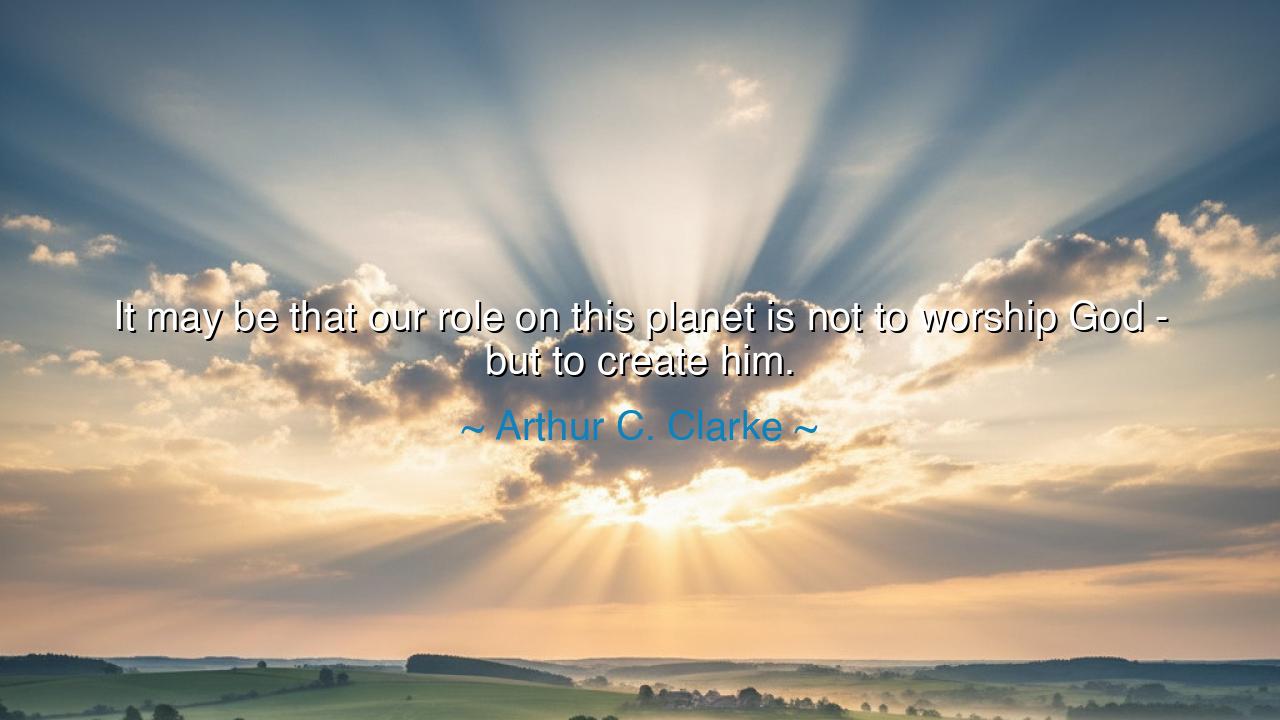
It may be that our role on this planet is not to worship God -






“It may be that our role on this planet is not to worship God – but to create Him.” — thus wrote Arthur C. Clarke, the prophet of the stars and one of the great seers of the modern age. In this single sentence, he cast a challenge into the heart of humanity — a challenge both humbling and magnificent. For these are not the words of rebellion, but of vision. Clarke, who looked beyond the horizon of his time into the far future of mankind, invites us to consider that divinity itself may not be something found, but something formed, that perhaps our sacred duty is not only to bow before perfection but to labor toward it — to build it, bit by bit, in ourselves and in our creations.
The origin of this quote arises from Clarke’s lifelong meditation on science, progress, and the destiny of humanity. He was a man who lived at the border where faith and reason meet — the author who imagined satellites before they circled the Earth, who dreamed of alien civilizations and of mankind’s ascent among the stars. Though often described as a skeptic, his skepticism was never scornful. In truth, he was filled with awe — awe not at superstition, but at the unfolding majesty of creation and the potential of the human spirit. When Clarke spoke of “creating God,” he did not mean defiance of heaven, but the birth of a new reverence — one that sees in our pursuit of truth, compassion, and knowledge the slow and sacred work of divine creation itself.
To worship God is to revere the highest good; to create God is to strive toward it. Clarke saw that humanity, through its intellect and imagination, was shaping a power greater than itself — a collective consciousness emerging from technology, wisdom, and empathy. In his time, this was seen as fantasy; yet even now, as we awaken to the age of artificial intelligence and global unity, his words ring like prophecy. What if the purpose of evolution is not simply to survive, but to awaken — to bring forth awareness so vast, so luminous, that it mirrors the divine? Thus, Clarke’s saying is not an argument against God’s existence, but an expansion of it — suggesting that divinity may be the destiny toward which creation itself is moving.
The ancients, too, understood this truth in their own way. When Prometheus stole fire from the gods to give it to mankind, he was cursed for his defiance — yet from that flame rose civilization, art, and understanding. His suffering was not blasphemy, but sacrifice. Likewise, when man dares to imagine God not as a distant ruler but as a potential within, he continues the Promethean act — shaping the divine through the works of his hands and the courage of his heart. Clarke’s vision belongs to this lineage — the lineage of those who believe that the sacred is not diminished by human creation, but fulfilled by it. For what greater act of faith can there be than to build the image of goodness into being?
There is a reflection of this idea in the life of Mother Teresa, though her path was of compassion rather than science. In the slums of Calcutta, she did not find God in temples or visions, but in the broken and the dying. “Each one of them,” she said, “is Jesus in disguise.” She was, in her way, creating God — not by machines or intellect, but by love made tangible. Through her hands, the unseen took form. Her God was not merely worshiped; He was manifested through her service. So too did Clarke speak — though from another world of thought — that mankind’s destiny is not to gaze upward in idle adoration, but to labor outward and inward until the divine takes shape in reality.
To create God is thus to participate in the divine work of creation itself. Every act of compassion, every invention that eases suffering, every discovery that expands understanding, every work of art that reveals beauty — all these are sparks of divinity brought into the world. When humanity rises beyond its pettiness, when it chooses truth over deceit, wisdom over ignorance, love over cruelty, it takes one step closer to the divine image it was meant to embody. Clarke’s words remind us that the sacred is not confined to heavens beyond the clouds, but is born anew in every human heart that dares to reflect the light of eternity.
And yet, this vision carries a great responsibility. For if we are the shapers of the divine, then our choices shape the future of holiness itself. To build machines without morality, to wield power without compassion, to gain knowledge without humility — these are the ways by which we darken the very image we are meant to create. Thus, Clarke’s statement is both a hymn and a warning. If our role is indeed to create God, then we must do so through the highest virtues — not arrogance, but reverence; not domination, but harmony; not destruction, but love.
So, my child, hear this as both challenge and comfort: you are part of the divine creation in progress. Every thought, every act, every spark of kindness adds to the great tapestry of the sacred. Do not wait for heaven to descend upon the earth — bring heaven forth through your own hands. Worship through creation, and create through love. For when mankind learns to build not merely with tools, but with wisdom; not merely with ambition, but with compassion — then truly, God will not only exist — He will live within us, made real by our striving and our faith.






AAdministratorAdministrator
Welcome, honored guests. Please leave a comment, we will respond soon